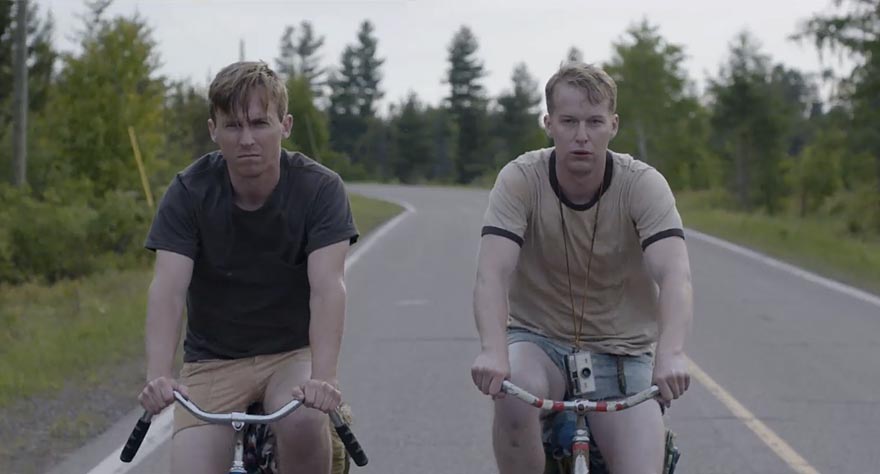
A coming-of-age story set in Vietnam War-era America drowns under the weight of its own premise.

A coming-of-age story set in Vietnam War-era America drowns under the weight of its own premise.
We all know the term “Oscar bait.” In one rendition of it, the tragic hero—whether that be Russell Crowe in Gladiator or Leonardo DiCaprio in Titanic—overcomes humble beginnings to heroically stave off adversity, winning honor and love. If you scale back that model 100 times, you have the indie version: an everyday guy tries avoiding the path life wants him to take, only to succumb to its inevitability.
Director Edd Benda’s feature-length debut, Superior, follows that much-traveled second route, except this everyday guy is actually two guys: best friends Derek (Paul Stanko) and Charlie (Thatcher Robinson), who in the summer of 1969 just graduated high school, and want one last hurrah before leaving their rural Michigan hometown for that dreaded thing we call adulthood. Charlie’s future is a bit more certain: he’s on his way to Michigan Tech. But Derek, with the Vietnam War in full swing and no plans of his own, fears his days until the draft are just a matter of time.
It sounds like a tailor-made premise to get audiences tearing up about all the good things in life: youth, friendship, and fate.
But even invoking the anxiety and dread of a draft, this film just fails to land any emotional punch. The problem, essentially, is the movie never quite feels like it begins. A title screen at the beginning cues us to the year, but Superior never commits to inviting us into its world. It doesn’t feel like 1969. The clothing (apparently everyone, and I mean everyone, wears flannel and short shorts) feels a bit like a lackluster costume party where the guests go far enough to acknowledge the requisite dress code, but not far enough to show a passion for details. The hair cuts feel modern. The clothes and Converse Chucks could pass just as much for ‘90s grunge as 1969. The laziness extends to the set design—and even the script. There was a way people talked back then, slightly more formal, different colloquialisms. But more egregiously, there are just no cultural references made at all (beyond the war): no newspaper mentioning Richard Nixon, no Marvin Gaye playing in the diner.
It might seem like much ado about nothing, but I think the failure to introduce us to time and place sees parallels elsewhere—most notably, and perhaps most damningly—in a lack of attention in introducing us to these characters. It’s not enough to start a movie and set up anonymous Friend 1 and Friend 2. We need to care about them as friends and that takes emotional preparation via history or conflict. When the boys get the idea to take one last journey together, an ambitious bike ride around Lake Superior, they could have just as well been acquaintances that had one class together in 12th grade. There’s no indication to how deep the bond runs.
This lack of foundation makes the entire first half hard to warm up to. As they tease each other on the road, running into each other’s bikes or splashing each other in the water, we know we’re supposed to feel the bonds of friendship, but the actions feel hollow without a story behind them. It’s only when Charlie and Derek start meeting unusual characters along the way that the film starts to feel like an actual story.
But unfortunately the shots of two teenagers riding through the Michigan wilderness is actually the movie’s high point.
The script’s roadmap is almost as easy to read as Derek’s map illustrating the trails around Lake Superior. Three mini climaxes, via road stops, increase the film’s intensity—or they would if they actually worked—before the final emotional climax (and you can probably guess what happens). But the middle of the film goes from trying and failing to… just being confusing.
The first stop is at a diner in Minnesota where they’re confronted by a pair of waitresses with thick Minnesotan accents, rolling off the line “Youuuu bet-cha!” with the enthusiasm of a Whose Line Is it Anyway? contestant trying to satirize a redneck. It’s here that I started to question if I misread the film as a drama. Is the script trying to be funny? Isn’t that an odd move amidst earnest string music and atmospheric shots of the lake and the trails—not to mention a setup about a teenager on the eve of a draft to Vietnam? The acting is a huge problem throughout this movie, but the spoof-like performances during their stops on the road are the film’s most distracting moments.
Stop #2 finds the boys at odds with a cooky old man who find Charlie and Derek snooping around his seemingly abandoned home. He holds a shotgun to Charlie’s head, until Derek says where they’re from (a source of kinship, evidently, with their newfound crack-job of a friend). “Oh, why didn’t you say so?” he asks, in the same tone as the guard to the Emerald City (after all, that’s apparently a horse of a different color), and he invites them in. Their stay with the man is bizarre, to say the least. By now, I wasn’t just not engaged with the film, but totally confused. Comedy? Drama? What is going on, man?
I could belabor the point, but clearly there’s not much to offer here despite a promising premise. By the time the two boys must face the big “conversation” at the end—the one where they inevitably face their changing relationship, Derek repeating his impending life as a solider—I had completely forgotten the Vietnam thread. It got lost in a convoluted middle section filled with failed humor and misplaced plot points. The only consolation, I suppose, is that for a film about Lake Superior, the shots of the lake are indeed beautiful.